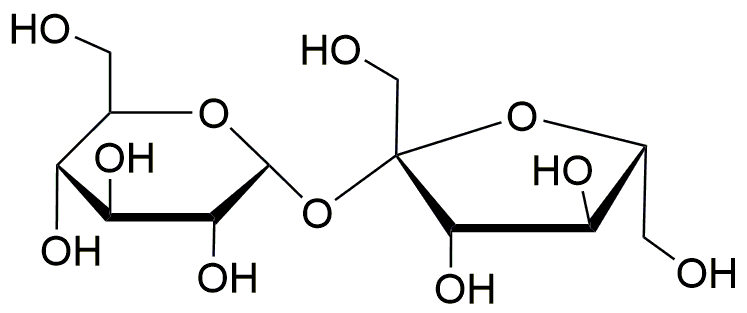Sucrose is widely utilized in research focused on:
- Food Industry: As a primary sweetener, sucrose enhances the flavor of various food products, including beverages, baked goods, and candies. Its ability to improve taste while providing energy makes it a staple in food formulation.
- Pharmaceuticals: In medicine, sucrose is often used as an excipient in drug formulations. It helps in masking the bitter taste of medications, making them more palatable for patients, especially children.
- Biotechnology: Sucrose serves as a carbon source in microbial fermentation processes. It supports the growth of microorganisms used in producing enzymes, biofuels, and other bioproducts, thus playing a crucial role in sustainable practices.
- Cosmetics: In the cosmetic industry, sucrose is used in scrubs and exfoliants due to its natural exfoliating properties. It helps to remove dead skin cells, leaving the skin smooth and rejuvenated.
- Research Applications: Sucrose is frequently employed in laboratory settings as a cryoprotectant for biological samples. It helps preserve cells and tissues during freezing, ensuring their viability for future studies.
General Information
Properties
Safety and Regulations
Applications
Sucrose is widely utilized in research focused on:
- Food Industry: As a primary sweetener, sucrose enhances the flavor of various food products, including beverages, baked goods, and candies. Its ability to improve taste while providing energy makes it a staple in food formulation.
- Pharmaceuticals: In medicine, sucrose is often used as an excipient in drug formulations. It helps in masking the bitter taste of medications, making them more palatable for patients, especially children.
- Biotechnology: Sucrose serves as a carbon source in microbial fermentation processes. It supports the growth of microorganisms used in producing enzymes, biofuels, and other bioproducts, thus playing a crucial role in sustainable practices.
- Cosmetics: In the cosmetic industry, sucrose is used in scrubs and exfoliants due to its natural exfoliating properties. It helps to remove dead skin cells, leaving the skin smooth and rejuvenated.
- Research Applications: Sucrose is frequently employed in laboratory settings as a cryoprotectant for biological samples. It helps preserve cells and tissues during freezing, ensuring their viability for future studies.
Documents
Safety Data Sheets (SDS)
The SDS provides comprehensive safety information on handling, storage, and disposal of the product.
Product Specification (PS)
The PS provides a comprehensive breakdown of the product’s properties, including chemical composition, physical state, purity, and storage requirements. It also details acceptable quality ranges and the product's intended applications.
Certificates of Analysis (COA)
Search for Certificates of Analysis (COA) by entering the products Lot Number. Lot and Batch Numbers can be found on a product’s label following the words ‘Lot’ or ‘Batch’.
Número de catálogo
Número de lote/lote
Certificates Of Origin (COO)
This COO confirms the country where the product was manufactured, and also details the materials and components used in it and whether it is derived from natural, synthetic, or other specific sources. This certificate may be required for customs, trade, and regulatory compliance.
Número de catálogo
Número de lote/lote
Safety Data Sheets (SDS)
The SDS provides comprehensive safety information on handling, storage, and disposal of the product.
DownloadProduct Specification (PS)
The PS provides a comprehensive breakdown of the product’s properties, including chemical composition, physical state, purity, and storage requirements. It also details acceptable quality ranges and the product's intended applications.
DownloadCertificates of Analysis (COA)
Search for Certificates of Analysis (COA) by entering the products Lot Number. Lot and Batch Numbers can be found on a product’s label following the words ‘Lot’ or ‘Batch’.
Número de catálogo
Número de lote/lote
Certificates Of Origin (COO)
This COO confirms the country where the product was manufactured, and also details the materials and components used in it and whether it is derived from natural, synthetic, or other specific sources. This certificate may be required for customs, trade, and regulatory compliance.

